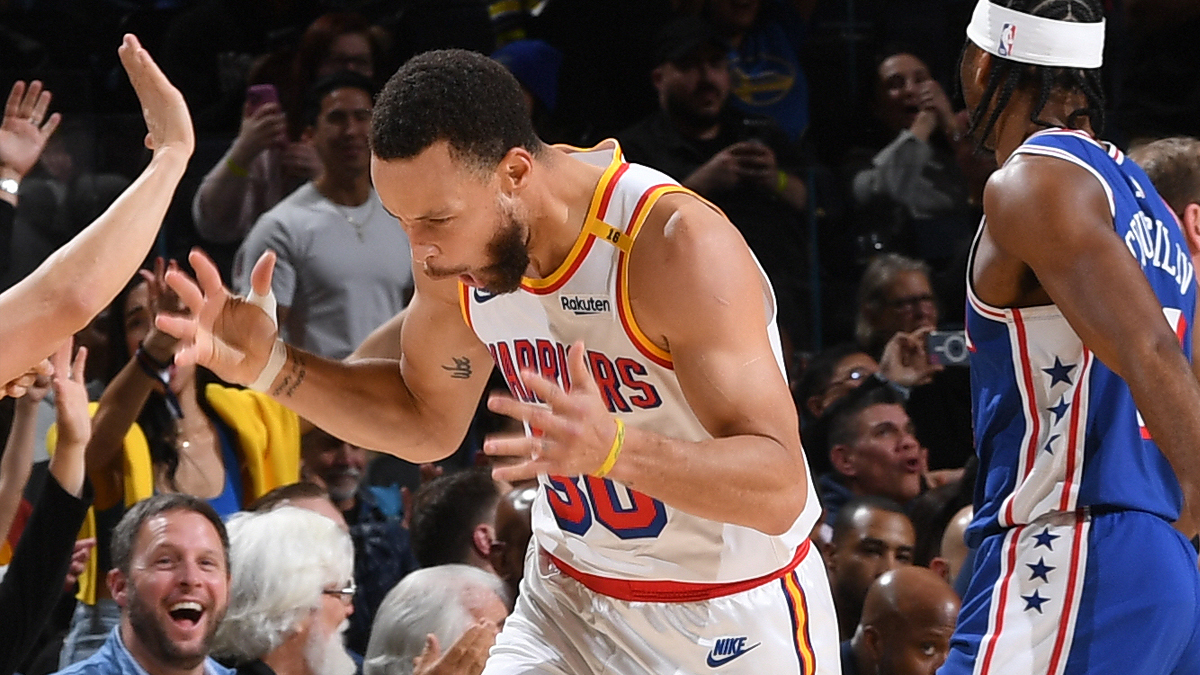SAN FRANCISCO – As difficult as it is for an athlete to reach the NBA, that in many ways is light work if that athlete knows he’s carrying the dreams of a nation.
Or, really, several nations.
As a member of the Golden State Warriors, Lindy Waters III spends many waking hours preparing for or playing in NBA games. Talent has taken the 6-foot-6 guard to the highest level of international basketball, and he represents the team every time he steps onto the floor.
For each of the 168 hours that comprise a week, Waters represents the nations of the Kiowa (KAI-uh-wuh) and Cherokee. He is one of three indigenous NBA players, along with Dallas Mavericks guard Kyrie Irving and Milwaukee Bucks forward MarJon Beauchamp. They have different tribes of origin, but there is unity in carrying the flag of their forefathers and the aggrieved history of displacement.
“It fuels me every single day knowing that these times now are so much easier than what they had to go through,” Waters said on NBC Sports Bay Area’s ‘Dubs Talk’ podcast. “I’m not going to let any little adversity that comes into my life effect anything. I’m going to keep pushing. I’m going to keep pressing on. And I’m going to keep fighting.
“I don’t like to compare exactly our circumstances because I can never be in their shoes, and I can never feel what they felt. But I know that I can continue to fight for what they fought for.”
Cursory knowledge of American history tells us that the land occupied by indigenous peoples was subjected to a hostile takeover from incoming white settlers. War was common, and the tribes were both outnumbered and lacked the sophisticated weaponry of their invaders.
Golden State Warriors
The Kiowa tribe originated in Canada, British Columbia to be precise, before migrating south in the 17th century through Montana, Nebraska, Kansas, Oklahoma and Texas. They were part of the Medicine Lodge Treaty of 1867, according to kiowatribe.org, but wound up at war with white settlers. Reservation land was opened for white settlement early in the 20th century, but 120 years later the Kiowa own only specific plots of land.
The Kiowa tribe population is roughly 10,000, with more than 7,000 in Oklahoma, where the Waters family settled. Lindy – “Trey” to family members – knows the history and considers it an honor to stand for those who literally fought to survive on the land they inhabited. Family is sacred.
Get a weekly recap of the latest San Francisco Bay Area housing news. >Sign up for NBC Bay Area’s Housing Deconstructed newsletter.
“Being Kiowa and Cherokee, you lean on your family,” he said. “You lean on your traditions and values and what we know from our history. I never let what happened to our people affect how I handle myself on a day-to-day basis. I like to treat everyone with respect because not everyone is out to get you.
“Sometimes, I can see lateral oppression amongst all races. That never allows us to fully grow and develop into what our society could be. I try to preach peace, and I try to preach love.”
Waters, 27, donates his time and his money to causes that directly benefit indigenous people. With the social awareness culled from his childhood, he recognized the challenges faced by tribal members. He set out to lend a hand, and in March 2022 founded the Lindy Waters III Foundation.
The purpose of the foundation is to empower native youth through “cultural enrichment, mental health advocacy, promoting physical wellness through sports, including basketball and culture camps.” In short, show the youngsters they can celebrate their identity while discovering avenues to a healthy life.
Waters’ foundation has made enough social inroads to attract the attention of the NBA, which last season, while he was with the Oklahoma City Thunder organization, named him one of five finalists for its Social Justice Champion award.
“It meant a lot to me and my family,” Waters said. “I was kind of blindsided by it. I wasn’t out to get that. But being recognized for my efforts ... big shout-out to my family because they help a lot with my foundation. It just makes me want to give back even more, at a higher level.”
The award, in the name of NBA legend Kareem Abdul-Jabbar, went to Karl-Anthony Towns, then a member of the Minnesota Timberwolves. The other finalists, in addition to Waters, were Bam Adebayo of the Miami Heat, CJ McCollum of the New Orleans Pelicans and Russell Westbrook of the LA Clippers.
Yet Waters’ background makes him unique amongst them. He remains devoted to such customs as stomp dances, pow-wows and group prayer, as well as the ritual burning of sweetgrass and cedar.
“We still hold the same Mother Earth close to us,” Waters said. “We still give back to the things that ultimately fuel us as people.”



